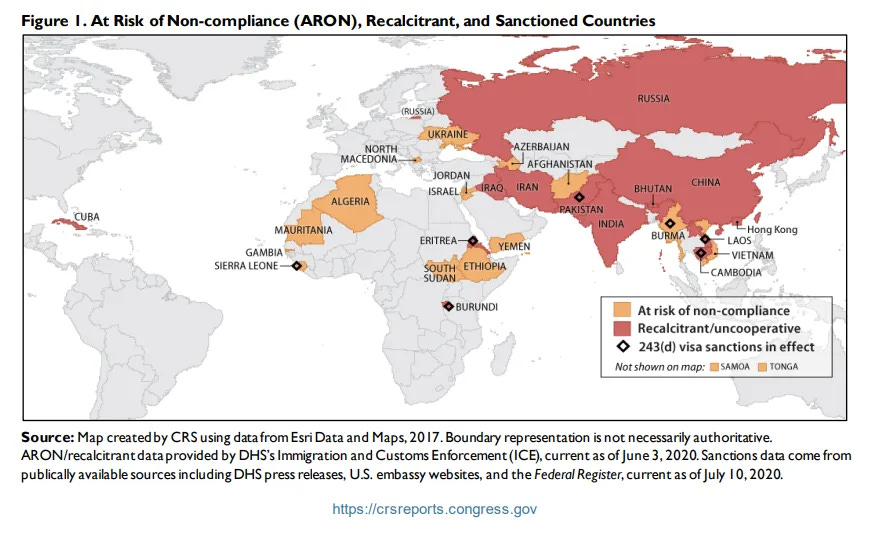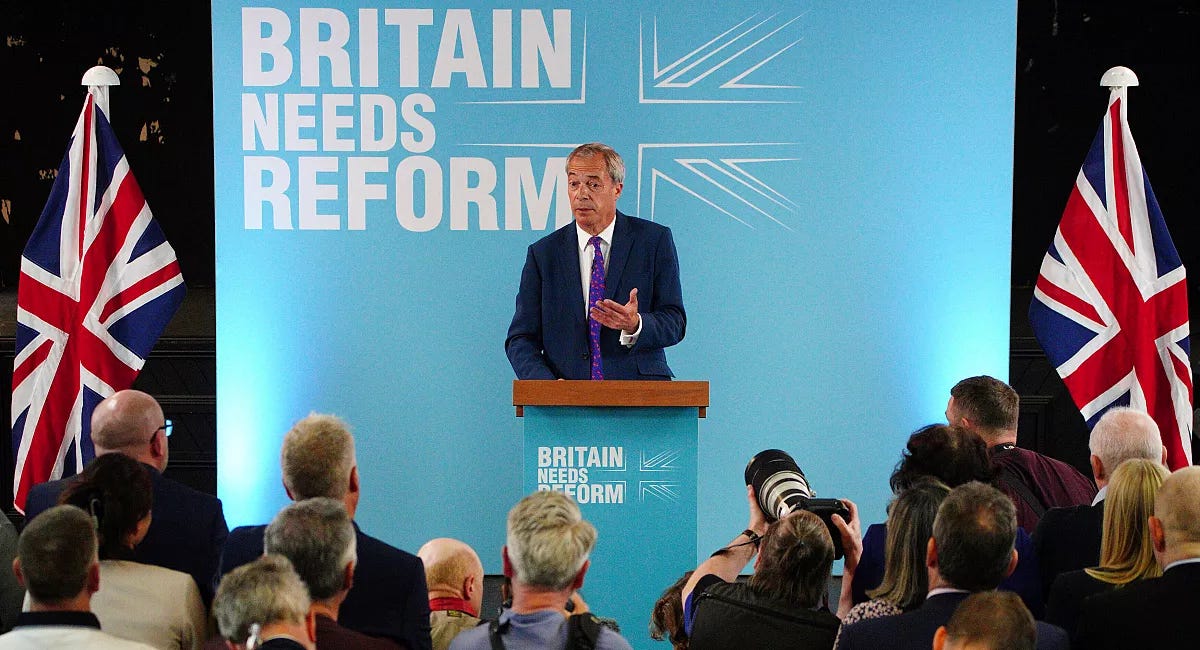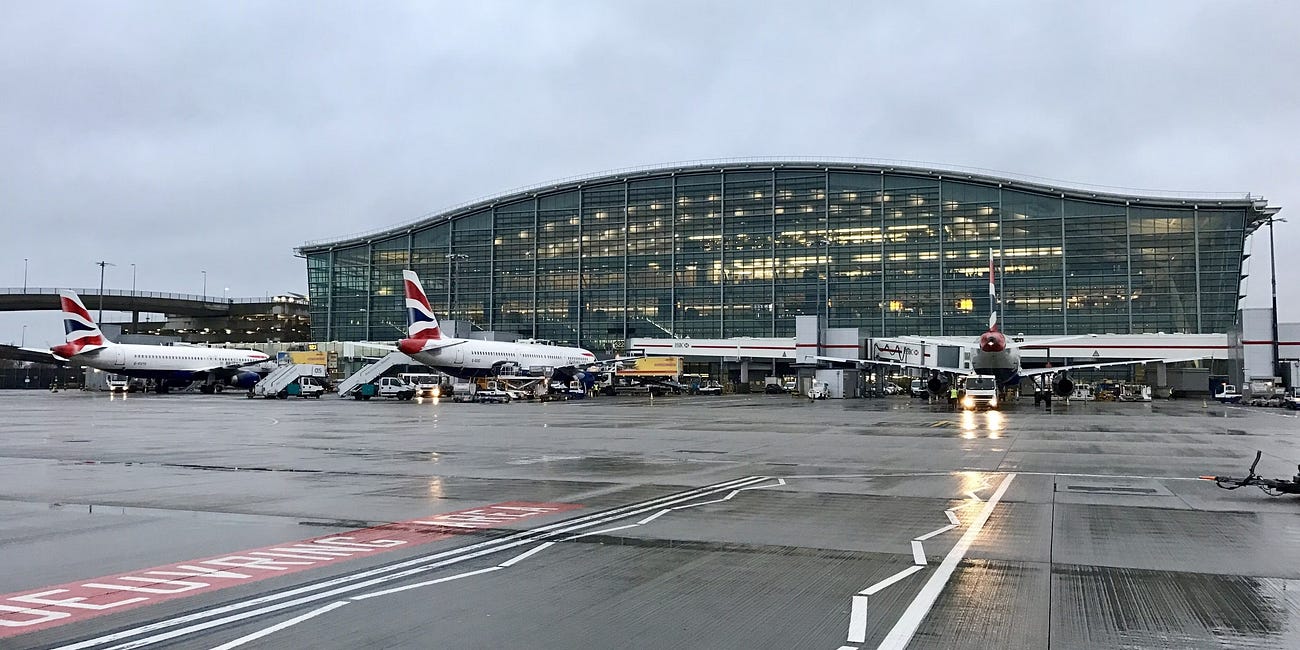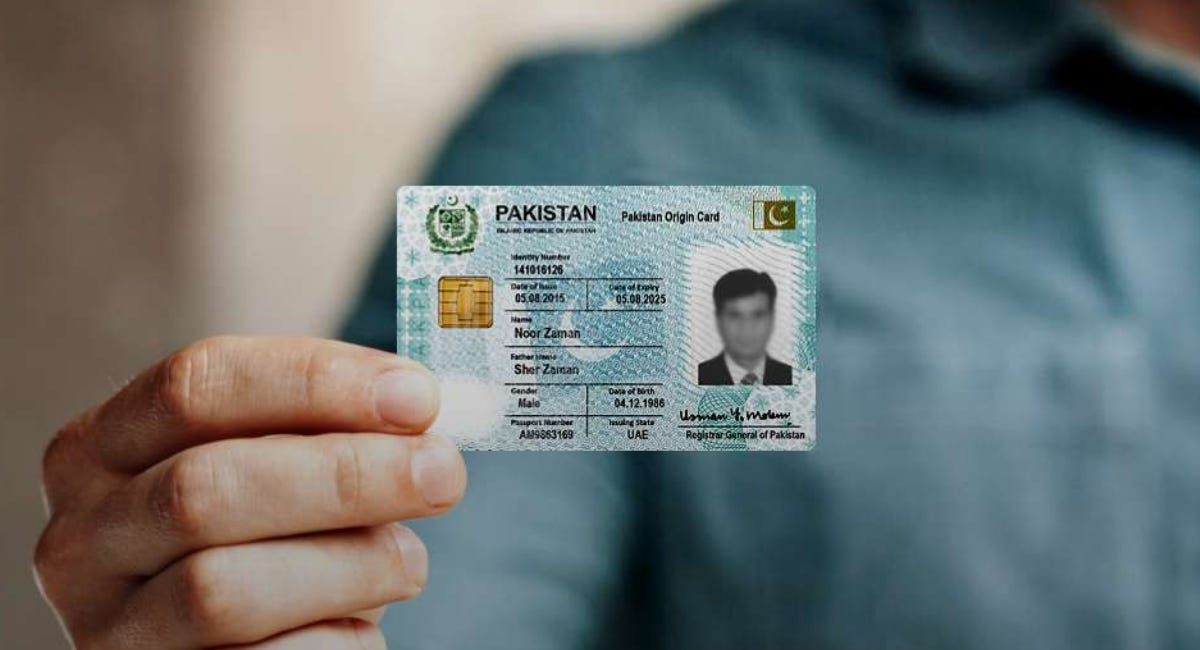The United Kingdom is coming apart. More than 12,000 dangerous criminal immigrants (not including the children of immigrants) have been released onto Britain’s streets, the English are a minority in several of our largest cities, and uppity second and third-generation immigrants are trying to erase our cultural heritage, sometimes rather violently, and in collusion with the left. Without substantial change it is likely that the ancient union of British peoples will eventually be scuttled, and the self determination of the British will be lost forever.
I have decided to centralize all the remigration policies from past White Papers articles – some mine and some not – from political party platforms, and from other sources into what I consider to be the definitive list of smart remigration policies for Britain.
Further, I am going to split these policies into two categories:
1. Mandatory Remigration Policies (MRPs), designed so the state may forcibly deport illegal immigrants, criminals, and other anti-British malcontents.
2. Voluntary Remigration Policies (VRPs), designed to repair demographic damage with the cooperation of those non-Britons who would leave the country if given the support to do so.
I propose that these policies be implemented and funded for a period of twelve years, or the average length of three parliamentary terms and not taking into account any possible snap elections. This timeline would give Britain time to appropriately alter other policies as the remigration policies take effect. Britain would have time to rework education policies to train domestic talent such as doctors and nurses without necessitating the immediate expulsion of foreign NHS workers or critical talent, for example. This timeframe would also allow voluntary repatriates proper time to make arrangements to leave and would lessen the decision-making pressure on those considering leave and allow them time to make the appropriate decision for their personal and familial circumstance. Most importantly this 12-year period would allow for a distribution of the fiscal outlays necessary to fund both MRPs and VRPs.
It is my sincere hope that the rising tide of national-conservative and nationalist policymakers will not only adopt these policy suggestions but build upon them in their mission to restore the British family of nations.
Mandatory Remigration Policies (MRPs)
1. Deporting All Illegal Immigrants: According to a parliamentary transcript from September of 2024 there are roughly 1.2 million illegal immigrants in the United Kingdom, namely from safe countries such as Vietnam, Albania, or Nigeria. Among these illegal immigrants are approximately 241,000 children. These numbers were from 2020 and so I must add the 150,000 people who have come to the United Kingdom in small boats since 2021 to the sum, thereby increasing the sum of illegal immigrants in Britain to, at minimum, 1.35 million people.
Illegal immigrants account for nearly 2% of the United Kingdom’s population and have no business in our country. If these trends persist spending on refugees will exceed £11 billion by 2026. It must stop.
The proper place for any illegal immigrant is their home country. Therefore, the first priority of the BRPP is the deportation of all illegal immigrants in the United Kingdom.

We know the United Kingdom can achieve this goal because it has a track record of high deportation figures. In the period of 2010 to 2014 annual removals peaked at 46,000 people with roughly 25,000 of those deportations being enforced or monitored deportations while the remaining 20,000 were voluntary. In this case voluntary means immigrants self-deporting upon being informed they must leave the country. Both enforced and voluntary deportations have since collapsed to below 20,000 and have remained in the low tens-of-thousands since 2019.
Currently the government has 2,200 detention beds for deportees, while simultaneously paying for 5,000 empty beds for expected migrant arrivals. As for occupied migrant beds, the British state is currently paying in excess of £4 billion annually to house migrants in 36,000 beds (generally in hotels).

If the British state can pay for 40,000-plus beds for migrant arrivals it can certainly afford to pay for 40,000-plus beds in order to detain deportees. With 83% of immigrants deported (or released, rather unfortunately) within 2 months it is clear the United Kingdom could facilitate rapid deportations upon expanding the number of detention places.
Assuming for the sake of debate, that deportations may take longer, say 3 months on average, the United Kingdom could use enforced deportation to remove 160,000 illegal immigrants a year. With the accompanying increase in voluntary returns the number of illegal immigrant returnees could top 200,000 annually. Under this policy environment the illegal immigrant population would be reduced to near-zero within 7 years – if voluntary returns were to rise higher than 40,000 per annum (which is likely) the illegal immigrant population could be reduced to zero in under 5 years.
Those foreign states that do not cooperate with enforced returns will be subject to policy reprisal and economic sanction, outlined in this policy piece:
Donald Trump has demonstrated the validity of this sanctions and economic reprisal based strategy through his recent tariff threats toward Colombia and Mexico, both of whom folded in a matter of hours and acceded to Trump’s immigration demands.
2. Denaturalise and Deport Dual-National Criminals: British law paces a duty upon the Home Secretary to deport foreign criminals, particularly those criminals who have been handed a prison sentence longer than 12 months. Not only are these deportations exceedingly rare and inefficient, according to parliamentary research briefing from August of 2024, but the Home Secretary is using ministerial discretion to minimize the number of foreign criminal deportations.
Not only must all foreign criminals be deported from Britain, but all dual nationals who have committed a crime in the United Kingdom must be stripped of their citizenship and sent to their ancestral homeland, regardless of second or even third generation immigrant status. A UK passport does not in itself make someone a member of these ancient British nations.
Thanks to a report with a forward penned by our proudly Guyanese Foreign Secretary, The Right Honourable David Lindon Lammy, the British public is aware that more than 1.6 million people of non-(native) British origin have a criminal record in the United Kingdom.
There is no reason for the British public to live alongside this staggeringly large population of non-British criminals. British law enables the Home Secretary to denaturalise any dual national of the UK, or person able to attain another nationality – determining that an individual is legally subject to denaturalisation is achieved by applying one or more of three criteria: a) should it be considered that doing so is conducive to the public good; b) if the person obtained their citizenship through fraud, false representation or concealment; or c) if the persons have conducted himself or herself in a manner which is, quote: “seriously prejudicial to the vital interests of the United Kingdom”.
It is a logical position that denaturalising and deporting all dual-national criminals is conducive to the public good and that the presence of more than 1.6 million non-British criminals is indeed seriously prejudicial to the vital interest of this country.
This goal is both achievable and would make a significant demographic difference. Thanks to an analysis by the New Statesman in December of 2021 we know that 50% of Asians and 40% of Black/Africans in Britain retain or qualify for citizenship in their country of ancestral origin. This means 650,000 to 800,000 non-British dual national criminals could be stripped of their British citizenship and deported to their countries of ancestral origin.
3. Comprehensively Review and Strip Citizenship from Fraudsters: The British state must undertake a comprehensive review of any grant of citizenship issued since the year 1991. Marriage fraud, pregnancy fraud, asylum fraud, student visa fraud, and numerous other practices have resulted in hundreds of thousands if not millions of immigrants being granted citizenship in violation of British law over the past 30 years.
A House of Commons impact assessment from September of 2013 estimates that roughly 10,000 immigrants enter the country under shame marriage arrangements each year. Assuming this has been going on since at least 1991 this would mean that more than 340,000 people have migrated to the United Kingdom under shame marriage arrangements. Most of these shame marriage criminals will have been granted citizenship and are now living life as British citizens in defiance of British law.
Another group known for committing serious and serial fraud are the 400,000-plus asylum seekers currently living in the United Kingdom. In a notable 2021 case – with a 9-year administrative history – an Albanian man known to have committed various categories of immigrant and citizenship fraud was not stripped of his British passport due to Home Office impotence. This is unacceptable.
Every asylee who has been granted British citizenship must have their asylum claim and citizenship grant reviewed and if necessary revoked. In particular the tens of thousands of asylees originating from India, Vietnam, Bangladesh, Albania, China, Brazil and other undeniably safe countries must be denaturalised and deported.
Then there are the rafts of ‘students’. In a 2024 Telegraph piece by Nick Timothy, it was revealed that 69% of people on graduate visas in the United Kingdom had applied after just one previous year of studies. A master’s program was completed in just one year? Nonsense! Additionally, 63% of those who lost their graduate visa switched to another visa upon its expiration. There is widespread fraud and with more than 12% (or about 10,000) of students given familial or work extensions to remain in the UK each year it is highly probably that tens of not hundreds of thousands of migrants who are now British citizens attained their UK passport via this path of easy fraud.

Though evidence from the United Kingdom and United States suggests a fraud rate as high as 70% to 80%, I will be generous and assume a fraud rate of just 50% among these categories of immigrants. With a fraud rate of 50% some 1.855 million of the 3.71 million non-EU naturalised citizens in the United Kingdom could have their British citizenship revoked, including the foreign-born spouses and children of citizenship fraudsters.
4. Gradual Reduction in Visa Holders: Between 2019 and 2023 the number of non-EU foreign workers in the United Kingdom has shot interminably upwards from 2.11 million to 3.55 million individuals. In addition, more than 600,000 dependents arrived during that same timeframe. From 2019 to 2023 the foreign population of the UK increased by more than 2 million people. Provisional numbers for 2024 show net immigration for the year was 728,000 individuals, the number of EU born residents decreased by 95,000.
According to these sums, it is clear there are roughly 4-4.2 million non-Western visa holders living in the United Kingdom as of year-end 2024. This figure does not include Americans, Australians, Canadians, or New Zealanders nor am I counting the 218,000 Ukrainians living in the United Kingdom, who are a rare example of genuine refugees.
All of these non-Western migrants must return to their home countries and alleviate pressure on Britain’s services, housing, schools, and cultural cohesion. Not least because the British public voted in four consecutive general elections for immigration in the tens of thousands and instead receive immigration in the multiple millions.
In order to accomplish this the United Kingdom must first establish a hard set of immigration caps. For the 12 years of this proposed policy program no more than 50,000 non-Western immigrants should be allowed to enter the United Kingdom per annum. The emigration of non-Westerners has averaged roughly 170,000 in the past three years, meaning that under this scheme the net immigration of today would turn negative and be the net emigration of tomorrow. With an average net loss of immigrants of 120,000 per year this scheme would see roughly 1.44 million immigrants depart the United Kingdom over the 12-year duration of the program, but this number is not the full picture. The maximum duration of work visas (to which familial visas are tied) is just 5 years and with this program putting an end to the extension of most visas there would be years such as 2028 and 2029 where the net emigration numbers would exceed 800,000 and 700,000 respectively. In short nearly the entire non-Western foreign-worker population of the United Kingdom could be returned to their home countries over the duration of this policy.
After this 12-year period this country should engage in a national debate about returning to a system with a rate of net immigration, though the figures should remain extremely low, court specialized talent, and focus on other Western peoples.
5. Employer Immigration Tax: This policy proposal originates in Reform UK’s 2024 election manifesto and so I will quote the manifesto paragraph in question:
“The National Insurance rate will be raised to 20% for foreign workers. This would incentivise businesses to employ British citizens whose National Insurance rate would stay at 13.8%. Essential foreign health and care workers would be exempt from the tax, as would businesses who employ 5 staff members and under. This would boost wages and could raise more than £20 billion over five years to pay for apprenticeships and training for young Brits”
This policy marks many of the key points of pressure needed to encourage self-deportation of visa holders by making them a liability instead of an asset in the British labour market. For example 85% of businesses that employ migrants have more than 0-9 employees, according to a 2019 report by His Majesty’s Revenue & Custom’s, and so they would be liable to pay the increased national insurance taxes.
Most importantly, young British men need work more than ever and the £20 billion that could be raised by this taxation over 5 years could go to training young British men for the roles in vehicle repair, technology maintenance, and communications technology that so many immigrants currently occupy. Similarly, many young Britons both male and female could have their place at in university medicine programs funded by these excess taxes.
Finally, this policy would incentivize businesses to get on board with the phase-out of visa holders in the country and contribute to adjusting their market expectations to either hire young Britons or to invest in the education system to change the labour market to suit their needs. Either way it will incentivize the private sector to begin training and hiring British talent as briskly as possible while at the same time phasing out foreign-born talent.
6. Secondary Policy Changes: Any nationalists and national-conservatives looking to govern effectively will need to enact a series of secondary policy changes to enable the primary policies outlined above to be enacted with efficiency.
This list is not comprehensive, but is nonetheless very necessary:
· Leave the European Court of Human Rights
· Tighten nationality law by extending the necessary period of residence to at least 10 years. Strengthening language, integration, and civics testing requirements. No person reliant on public assistance should ever be naturalised.
· Robust border security, stopping the boats, and immediate deportations for illegal entrants.
· Abolish caps on the number of British students who may enter university to study medicine along with increasing the number of medical student places by at least 30%. Abolish foreigner-only courses and mandate they be transitioned to train British doctors.
· Limit the number of foreign students to no more than 10% of the total student population. The United States university system persists with a foreign student share of just 6%.
· Local police must collect and pass on information regarding any arrestee’s immigration status to the Home Office.
· All public sector workers (including NHS, educational, and local authority employees) must report any illegal aliens to the Home Office. Sweden already has such a law.
· Drastically limit the number and scope of immigration appeals through primary legislation.
· Reestablish parliamentary sovereignty by abolishing the Supreme Court’s ability to rule on issues of immigration, remigration, deportation, and demographics.
(Ideally abolish the Supreme Court in its entirety, Britain survive just fine without it prior to 2009.)
Through this series of Mandatory Remigration Policies (MRPs) the United Kingdom could see the deportation and removal of roughly 7 to 7.7 million non-Western immigrants and their descendants, out of the total non-Western population of roughly 13.8 million people.
Assuming 7 million people depart the United Kingdom under these policies, and assuming that the native British population falls from 51.4 million today to 50 million in the 12 years after enacting this policy suite, the native British share of the UK population would increase from 76.8% today to 80.6% post mandatory repatriation. This represents a roughly 4-point increase in the population share of native Britons and the undoing of roughly 15 years of demographic replacement in the country.
I reached the population figure by projecting the national population for 2024 to be 69 million, or a 1% increase from 2023, as has been common for the last three years. I also assumed the minority share of the population is roughly 20% since upwards of 86% of all net migration has been of non-EU nationals since 2021. I believe these to be conservative population estimates.
The deportee figure has a 0.7-million-person margin because there will be overlap between dual national criminals and immigration fraudsters.
Voluntary Remigration Policies (VRPs),
After putting in place Mandatory Remigration Policies (MRPs) there will be roughly 6.8 million non-Western immigrants and their descendants still present in the United Kingdom. Some of these immigrants will be lawfully and honestly naturalized immigrants who wish to remain in the country they love and should indeed be allowed to do. Other members of this cohort, if not the majority, will represent second and third-generation immigrants born in the United Kingdom to immigrant parents. Some of these second and third-generation immigrants such as former Home Secretary Suella Braverman (KC, MP) will doubtlessly wish to remain in the United Kingdom to serve the country they love and the nations they wish to preserve.
Regardless, many second and third-generation immigrants, as well as some naturalised UK citizens without dual citizenship, wish to leave the United Kingdom and return to their homelands.
Therefore, voluntary and supported remigration schemes are necessary:
1. Paid Voluntary Remigration: The marketing organization Word on the Curb conducted a survey of over 1,600 non-British namely ethnic minority people aged 16 to 34 in the United Kingdom and found that 66% of these non-Britons were considering or actively planning to leave the United Kingdom. The poll also covered the various reasons that these individuals want to relocate from this island nation.
59% of the non-British youth who stated they wanted to leave the United Kingdom cited a worsening quality of life, while 28% were dissatisfied with the government, and 44% believed they could garner better wages abroad. Interestingly, slightly less than 20% of those surveyed cited a perception of racial discrimination as a motivating factor, though 39% stated that Britain suffered from “bad vibes”. These “bad vibes” were reiterated several times in the video interviews.
As such this paid voluntary remigration policy calls for a one-time payment of £65,000 to each repatriate. This figure represents slightly less than double the median annual earnings of £37,430 in the United Kingdom. Most importantly, this remigration payment represents nearly 40 years’ worth of earnings in India, nearly 10 years’ worth of earnings in the Caribbean, and in some African states exceeds 50 or even 80 years’ worth of average earnings. Put another way, this sum could cover nearly 12 years of rent for a luxury 4 bedroom apart in Karachi or New Delhi while in Africa it could finance the building of a home and business.
This program would also pay for the flights and bureaucratic fees necessary for repatriates to leave the country. With the average flight to Asia costing £156 and the average cost of a multiple entry visa to India or Pakistan costing roughly £75 the administrative backend of repatriation should not be costly in terms of outlays to repatriates. Additionally, if the United Kingdom’s bureaucracy can spend £4.3 billion to support illegal immigrant and refugee arrivals to Britain it can certainly afford a remigration focused bureaucracy for 12 years.
2. Unpaid Voluntary Remigration: There will also be repatriates who can leave Britain without paid assistance due to familial wealth, savings, or extant income from remote work for example. These repatriates will require administrative assistance rather than financial help in departing the United Kingdom.
For example, a Pakistani or Indian programmer who retains their UK based remote-work position but wishes to return to their ancestral homeland may not know that both India and Pakistan offer diaspora-based visas that would allow him to permanently live, work, and purchase land in his homeland.
For this reason, the United Kingdom’s Home Office must establish a Remigration Information Service that non-Britons who wish to return to their countries of origin can contact for information on their options and if necessary, can be put into contact with a solicitor or firm to help facilitate the process. This process should be accompanied by a large-scale ad campaign to make the public aware of the service.
This process could result in the creation of a new private sector business category of firms dedicated to helping both paid and unpaid voluntary repatriates in their mission to leave the country. Firms would be needed to help facilitate employment, housing, moving, and travel. This would take some of the administrative pressure off the British state and mean that some remigration related outlays whether remigration payments or administrative spending would remain in the UK economy.
A final incentive for both programs is that the British state will cancel up to £35,000 in debt for individual repatriates. This will relieve millions of would be repatriates of their obligations to pay for mortgage, university, vehicle, or credit-based debt and enable them to relocate abroad without concerns over UK based debts. Those who opt not to sell their properties and to simply take debt cancellation will see their UK based property (though not personal belongings) revert to a government or bank trust to be resold or redeveloped.
How many will go? There are 2.6 million non-Britons between the ages of 16 and 34 in the United Kingdom and if 66% of those individuals were to depart it would number some 1.7 million people, according to the study by Word on the Curb. If we extend this 66% relocation desire to the entirety of the UK’s ‘remaining’ 6.8 million non-Westerners, then we can expect that roughly 4.48 million non-Britons would leave the country under a voluntary remigration scheme. Even if this figure decreased to say a 50% desire to relocate among all remaining non-Western people in the United Kingdom, then 3.4 million repatriates would still move abroad.
Many of the remaining 2.32 to 3.4 non-Western people will be the spouses, partners, and mixed-background children of native Britons. There are 1.8 million people mixed-Britons while roughly 2 in 10 mixed-background relationships in Britan involve a Briton and non-Western individual. These individuals are inextricably linked to, a part of, or integrated into the British nation and should remain as welcome to stay in Britain as they are today.
Finally, there would be the few non-Western immigrants permitted into the United Kingdom during the 12-year duration of the BRPP. This population would amount to roughly 250,000 people assuming the full 50,000 quota is met each year and immigrants depart after 5 years of residence.
The MRP and VRP policies could result in the native British population increasing from its current share of 76.8% of the UK’s population to an 86.55% share post-remigration, an 9.75-point increase that would represent the undoing of nearly 22 years of unwanted demographic change in Britain. The remaining non-Western/minority population of the United Kingdom would correspond to roughly 4.45% of the population while the non-British White population would represent a 7.24% share of the population.
Post-remigration the Western share of the British population will increase to 93.8%. These non-British Europeans and North Americans can be integrated into the British populace within a generation or less, unlike most non-Western immigrants. A process I outline in this piece:
An additional 1.76% of the population would be made up of some those who have previously identified as ‘other’ and are often duplicated on the census and therefore could not be categorized in these numbers properly. Many of these ‘other’ and duplicate category individuals are Arabs, Albanians, Jewish people, Armenians, mixed race people with no cohesive identity, and other generally hard to categorize ethnic minorities in the country.
What will this cost? This is an understandable question as many Britons will balk at the idea of billions of pounds in outlays to facilitate both the mandatory and voluntary remigration schemes. It is key to understand that without these schemes the United Kingdom’s fiscal situation will only continue to deteriorate and if any patriotic Briton is truly dedicated to correctly the fiscal ship, they must also be an advocate of remigration.
For example, we can expect at least 50% of voluntary repatriates to opt for paid remigration schemes as some 47% of minority households in the UK find it difficult to afford their rent or mortgage payments, according to an Institute of Race Relations article. This adds up to a sum of £118.6 billion over the course of the 12-year voluntary repatriation scheme or roughly £9.885 billion per annum. This sum must be put in context.
The United Kingdom spent upwards of £17 billion on policing in England and Wales for fiscal year 2022-2023. A country with a comparable population to England (56 million) is that of Poland (40 million) but the Poles are not spending £17 billion to police their population, instead they are spending just £2.3 billion on their police force. This figure represents more than a difference in pay. The average police officer in Poland has an income of some £21,800 annually, while the average constable hired after 2013 in the United Kingdom will start at a salary of some £23,556, according to the UK Police Federation. The difference is clearly one of demographics.
Prisons are another area the British public is spending in grand fashion. There are, by the latest count, 87,869 people in His Majesty’s custody. The Ministry of Justice also expects the prison population to exceed 106,000 people by 2027, dramatically increasing capital costs as the country will be forced to build a raft of new detention facilities.
28.2%, or roughly 24,766 of the current prisoners are non-British and other foreigners. The British government spends roughly £48,409 for each prisoner it houses, meaning the cost of the non-British prison population is some £1.2 billion annually.
And then there is the cost behemoth of the NHS. In 2021 the British state spent £4,188 per person as part of the £280.7 billion NHS budget. With non-Britons of non-Western origin making up 18-20% of the UK population this means that the NHS is spending upwards of £52.35 billion each year and every year on the non-British population.
The United Kingdom will continue to suffer financially unless remigration takes place and takes hundreds of billions of pounds of lifetime fiscal burdens off the shoulders of the native British people.
Imagine Britain with 11.23 million fewer residents, with fewer drivers on the road, fewer people competing for public and private housing, and fewer people attempting to crowd public transit, the benefits office, and the NHS. The quality of life of Britons and the sustainability of our state and island home depend on remigration.
It is time for the British Remigration Policy Platform.





